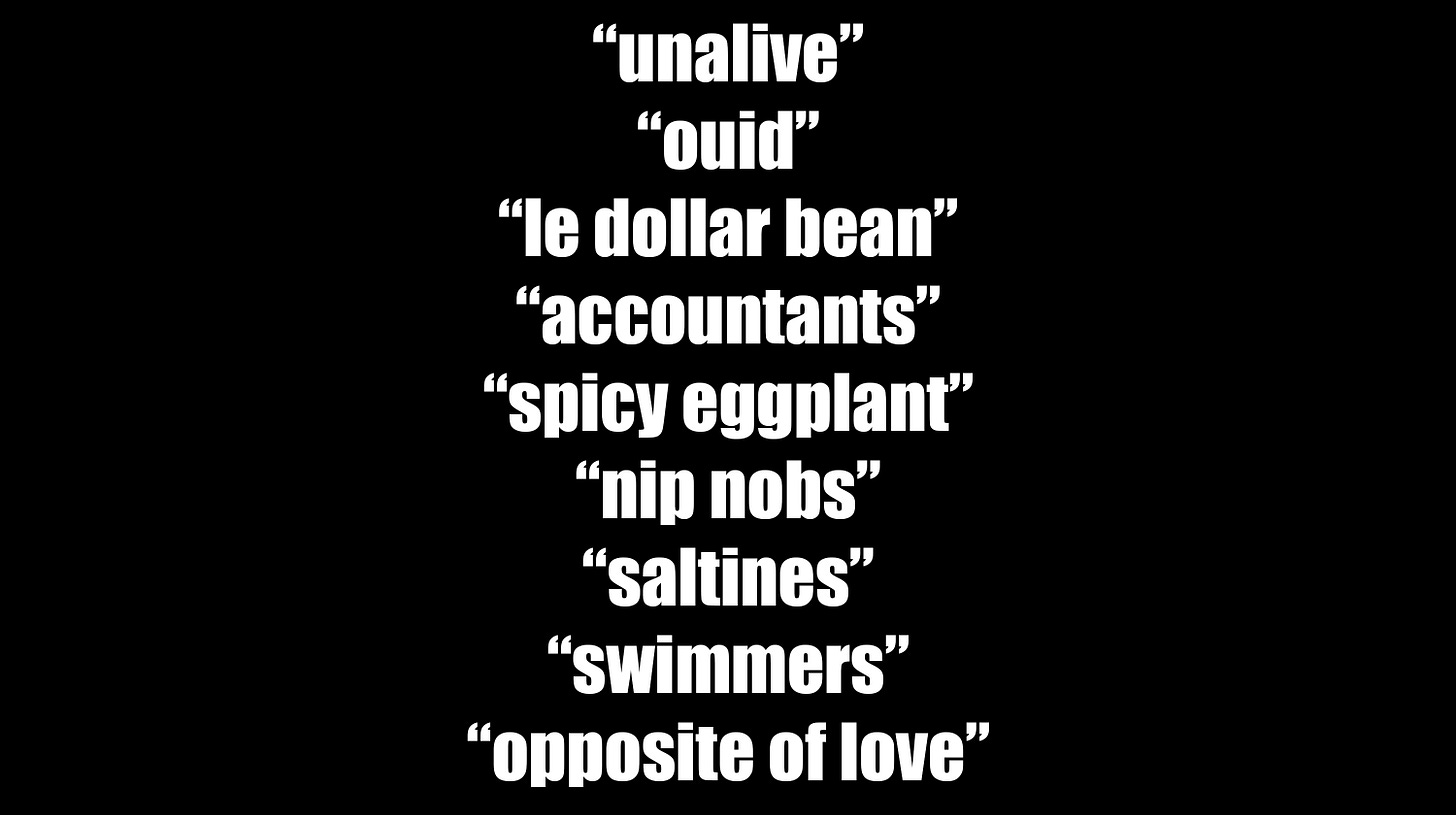Hello again.
This is Understanding TikTok – your TikTok update. My name is Marcus. Here are some TikTok related things from the last 24 days. TikTok was the top app by worldwide downloads in Q1 2022 (Techcrunch) – “no app has had more downloads than TikTok since the start of 2018." And TikTok's ad revenue is to surpass Twitter and Snapchat combined in 2022 (Reuters).
Today we talk about:
🐡 Algospeak
🏡 AR Effect House
👩🏽🏫 Analysis creators
🇺🇦 Ukraine Status Update
But first, let’s recap the last couple of days concerning the war and TikTok.
⚡TikTok said it removed 321,784 fake accounts in Russia and 46,298 fake accounts in Ukraine from February 24 - March 31, 2022 (TikTok). Non-profit tracking.exposed has found out, that “on March 6, TikTok said it would ban new content uploads in Russia but the ban implementation was inconsistent until March 25, including a period around March 23 - 25 where new uploads were not actually banned on the desktop application.“ The Washington Post has more on the findings: TikTok created an alternate universe just for Russia.
⚡ Russian state media is still posting to TikTok a month after the app blocked new content, writes Techcrunch on April 13. Quote: “RIA Novosti and RT editor-in-chief Margarita Simonya…are still active in spite of TikTok’s stated policy blocking new content from Russia.” I just checked both accounts. They are still there but without any content. At least while trying to access them from Germany.
⚡ Shayan Sardarizadeh has written a nice summary how TikTok has emerged as one of the leading platforms for snappy false videos about the war in Ukraine which are reaching millions for the BBC: False TikTok videos. The Guardian with a text on Pro-war memes, Z symbols and blue and yellow flags: Russian influencers at war. Yet again, thanks Henner for the link!
⚡And here (Springer Link) is a really interesting sounding conference paper that presents the results of an applied political research on the use of TikTok as a tool of protest mobilization on the example of mass actions that took place in Russian cities in the winter 2021. The aim of the study was to determine the distinctive characteristics of the platform that make it possible to effectively use it for organizing, coordinating and providing information support for protests.
🐡Algospeak
To avoid angering the almighty algorithm, people are creating a new vocabulary, writes Taylor Lorenz for Washington Post. “Algospeak” is becoming increasingly common across the Internet as people seek to bypass content moderation filters… it’s common to say “unalive” rather than “dead,” “SA” instead of “sexual assault,” or “spicy eggplant” instead of “vibrator.” And you might have seen that on TikTok, right?!
All this has turned communicators of all kinds — from fashion influencers to public health specialists — into Kremlinologists who obsessively analyze the behavior of social media algorithms in the hopes of learning how to please them and (more importantly) how to avoid their punishments, writes Cory Doctorow.
This is certainly true for marginalized creators [who] have continued to find new and ingenious ways to not only create but also successfully share anti-racist, anti-misogynistic, LGBTQIA+supportive, and body-positive content on the platform, as Chelsea Peterson-Salahuddin argues in a new paper for New Media & Society.
You will find examples in any kind of language and it will be a great job for future media archeologists to decode all of them. In order to help here: “led-dollar-bean” is a
a euphemism for lesbian derived from the way that text-to-speech engines pronounce “le$bian.”
🏡 AR Effect House
TikTok launches its own AR development platform, Effect House. The launch will put TikTok in closer competition with both Snap and Meta, both of which already offer a range of tools that allow developers to build out AR experiences and effects for their own respective families of applications (Techcrunch).
Formerly available to 450 closed-beta partners, which have collectively achieved 1.5 billion videos and 600 billion views, the platform is now in open beta for everyone else (ARInsider).
It’s a logical move from TikTok, argues SocialMediaToday, as TikTok looks to become a bigger player in the space, and encourage more creators to take part in the app. The initiative will also enable top effects creators to monetize their work by partnering with sponsor brands, adding another pathway for TikTok to fuel its own creator economy.
👩🏽🏫 Analysis creators
Terry Nguyen reporter for The Goods at Vox is doing an awesome job pinning down and explaining internet trends these days. One of her latest articles is on In-depth analysis.
“When you’re on TikTok, you don’t want to see news anchors or expert sources explaining a situation,” said Sam Ayele, an internet meme researcher and PhD student at the IMT School for Advanced Studies Lucca in Italy. You rather want to see a certain style of commentary that for instance Rayne Fisher-Quann (compare #69) is practicing.
This style of commentary is gaining prominence among TikTok creators — influencers, trend forecasters, armchair media pundits, and celebrity analysts, to name a few. These “analysis creators” are a marked departure from the earliest days of the app when content was short, simple, and straightforward. Dance challenges, theatrical lip-syncs, and quippy comedy bits were once all condensed into 15-second clips. There was literally no time for theorizing. As TikTok allowed users to upload lengthier videos (now up to 10 minutes long), its algorithmic preferences have also shifted.
Maybe all that can be done, to maintain a modicum of sanity on the internet, is to derive meaning from this never-ending content mill, Nguyen concludes. The only other option would be to pull the plug 🔌.
🍯 More
Nonetheless, TikTok is (still) flooded with pro-Johnny Depp content (Daily Dot). Chris Stokel-Walker tries to unwrap for Time with great quotes from Abbie and Tom.
The presidential elections in Colombia will be held on 29 May 2022. BBC News has a nice little video report about TikTok’s role in it.
The Taliban van TikTok (Bloomberg). Who would have thought?! The app is ‘misleading’ youth in Afghanistan. And elsewhere.
Robert Pattinson is fake. Deep fake. At least on TikTok (The Sydney Morning Herald).
Content has never felt more forced than that of celebrities and IG influencers who got on TikTok in 2022, tweets Jules. Yeah, but what can you do? Self-conscious affect! Florene Welch leads the way, says Dirt.
I skip the rest. But i do have to include Coastal Grandma Aesthetic, and another take from Nguyen on Gen Z’s dream of labor. Oh. And. I don’t have goals. I don’t have ambition. I only want to be attractive. Ciao.









